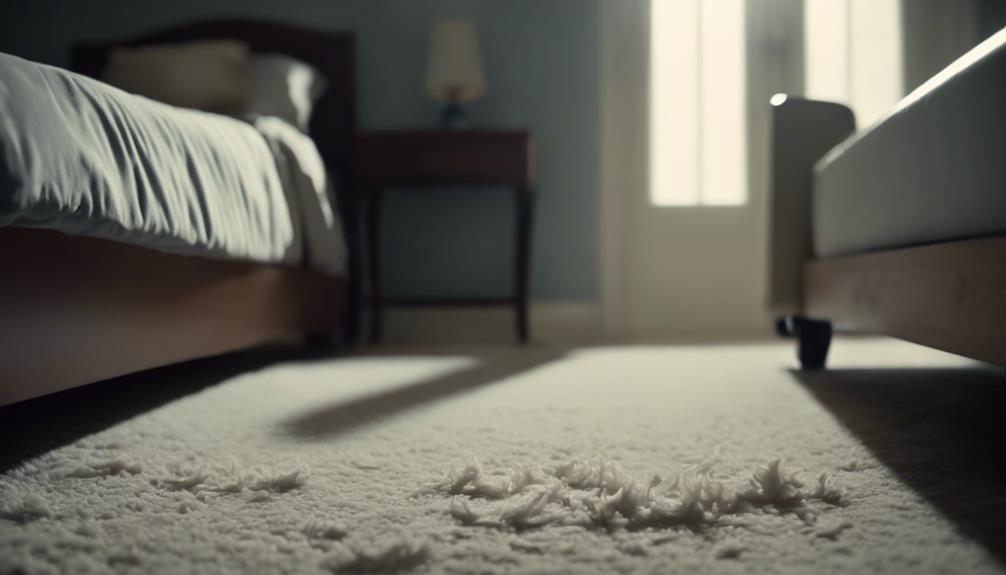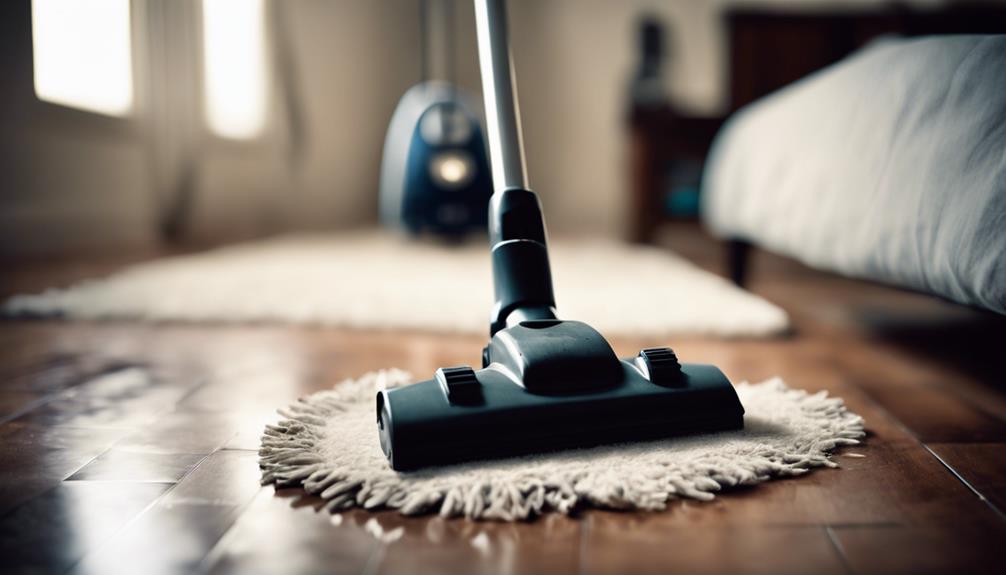To keep your bedroom floors fresh, vacuum at least twice a week before mopping weekly. This routine removes dust, allergens, and pet hair effectively. Adjust schedules based on pet shedding and high traffic. For a healthier environment, mop hardwood floors monthly and tile floors every 1-2 weeks. Deep clean carpets annually to maintain freshness. Maintaining cleanliness adds to the overall indoor air quality. Remember, consistent cleaning habits enhance the hygiene of your living space and promote well-being. Further insights into best cleaning practices are available in the detailed research above.
Factors Influencing Cleaning Frequency
To determine how often you should vacuum and mop your bedroom floors, consider the factors that influence the cleaning frequency. The type of flooring in your bedroom plays a vital role in determining how frequently you should clean. Bedrooms with carpeting tend to trap more dust, pet hair, and allergens, requiring more regular vacuuming compared to hard flooring surfaces.
Additionally, the amount of foot traffic in your bedroom impacts the cleaning frequency. High-traffic areas may need more frequent vacuuming and mopping to maintain cleanliness.
If you have pets in your bedroom, especially those that shed hair or dander, you should increase the frequency of cleaning to ensure a healthy environment. Pet hair and dander can accumulate quickly, leading to allergies and respiratory issues if not cleaned regularly.
It's essential to incorporate regular vacuuming into your cleaning routine to prevent the build-up of dust, dirt, and allergens in your bedroom, promoting a clean and hygienic space.
Household Size and Vacuuming Frequency
Consider how the size of your household directly influences how frequently you should vacuum your bedroom floors. Larger households typically experience higher foot traffic, leading to more dirt and debris accumulating in the bedrooms. With more occupants, especially children and pets, it becomes important to vacuum more often to maintain cleanliness and hygiene standards. The number of bedrooms in your home also plays a role in determining the time and effort required for vacuuming, potentially influencing your cleaning schedule.
Furthermore, the size and layout of your bedrooms should be taken into account. Larger rooms tend to collect more dust and allergens, necessitating more frequent vacuuming sessions. Regular vacuuming is essential for minimizing indoor air pollutants like allergens, dust mites, and pet dander, especially important for individuals sensitive to these substances. By adjusting your vacuuming frequency based on your household size and specific needs, you can promote a healthier and cleaner environment in your bedrooms.
Impact of Pets on Cleaning Schedule

Pets greatly impact the frequency at which you should clean your bedroom floors, especially if you have heavy shedders like dogs or cats. These furry companions often leave behind hair and dander, necessitating more frequent cleaning.
For dog owners, vacuuming the bedroom floors at least twice a week is recommended to keep up with the shedding. Cat owners may find themselves needing to vacuum every 2-3 days to manage the accumulation of pet hair and dander effectively. Adjusting your cleaning schedule based on your pet's shedding tendencies and the amount of dirt they track into the bedroom is vital to maintaining a clean living space.
Regular vacuuming is essential for pet owners to reduce allergens in the home and maintain a hygienic environment. Consider incorporating a monthly deep cleaning session to thoroughly remove pet hair, dander, and dirt that may have built up over time.
Allergies and Cleaning Routine
Regularly vacuuming and mopping your bedroom floors is vital in combating allergies triggered by dust mites, pet dander, and pollen. Allergies can be a constant struggle, but maintaining a consistent cleaning routine can make a significant difference.
By vacuuming and mopping at least once a week, you can reduce allergens in your bedroom and create a cleaner indoor environment. Since people spend about 8 hours a day in their bedrooms, it's important to keep this space allergen-free.
Dust and dirt tend to accumulate quickly on bedroom floors, which can exacerbate respiratory issues for those prone to allergies. Fortunately, by implementing regular vacuuming and mopping practices, you can improve indoor air quality and alleviate allergy symptoms.
Stay proactive in your cleaning routine to make sure that your bedroom remains a sanctuary, free from common allergens that can cause discomfort and health issues.
High-Traffic Areas and Special Considerations

In high-traffic areas of your bedroom, like near doorways or under desks, you should vacuum at least twice a week to keep dirt and debris under control. Consider using a vacuum with specialized attachments for better cleaning results in these busy spots.
For pet-friendly cleaning, focus on areas where your furry friends spend the most time to combat dander and fur buildup effectively.
Heavy Foot Traffic
Consider focusing on the high-traffic areas in your bedroom for more efficient cleaning and maintenance. Bedrooms with heavy foot traffic, like areas near the door or around the bed, should be vacuumed at least twice a week to remove dirt buildup and allergens.
Don't forget to vacuum under furniture, such as the bed and dressers, to eliminate dust and allergens that accumulate in hidden spots. Regularly vacuuming these high-traffic zones not only helps maintain indoor air quality but also prevents the accumulation of dust mites and other allergens.
Giving special attention to areas where people walk most frequently in the bedroom will guarantee a clean and hygienic living space.
Pet-Friendly Cleaning Options
How can you effectively maintain cleanliness in high-traffic areas of your bedroom, especially those frequented by pets?
In high-traffic areas with pets, it's important to engage in frequent vacuuming to combat the accumulation of pet hair, dander, and allergens. Opt for a vacuum equipped with specialized pet hair cleaning features to guarantee effective removal of pet-related debris.
Regular vacuuming not only helps in maintaining hygiene but also minimizes allergens, creating a healthier environment for both pets and humans. Consider daily vacuuming in areas heavily used by pets to prevent the buildup of dirt and pet hair on bedroom floors.
Additionally, choosing a vacuum with HEPA filters can assist in capturing and trapping pet allergens, contributing to a cleaner space in pet-friendly bedrooms.
Extending Cleanliness Between Sessions
To maintain a cleaner bedroom floor between vacuuming and mopping sessions, implementing preventive measures can greatly reduce the accumulation of dirt and debris.
For hard surface floors, consider using doormats at bedroom entrances to reduce dirt and debris transfer onto floors. Additionally, implementing a 'no shoes' policy in bedrooms can minimize dirt accumulation and extend cleanliness.
Regularly dusting bedroom surfaces can prevent dirt buildup, hence prolonging the need for vacuuming. Utilizing area rugs in high-traffic areas of bedrooms not only protects flooring but also minimizes vacuuming frequency.
Encouraging proper ventilation in bedrooms reduces dust and helps maintain a cleaner environment between vacuuming sessions. By incorporating these strategies, you can effectively extend the cleanliness of your bedroom floors, making the vacuuming and mopping sessions more efficient and less frequent.
Optimal Mopping Frequency

To determine the ideal mopping frequency for your bedroom floor, consider the following factors:
- Timing that yields the best results
- Comparing different cleaning techniques
- Taking into account the material of your floor
Adjust the frequency as needed based on the usage of the room and the likelihood of spills and dirt accumulation.
Timing for Best Results
For best results, make sure you mop your bedroom floors at least once a week to effectively remove dirt, dust, and allergens.
To achieve peak cleanliness and freshness in your bedroom, consider the following:
- Twice a Week: Increase mopping frequency to twice a week in high-traffic bedrooms to maintain a pristine environment.
- Prevent Buildup: Regular mopping helps prevent dirt buildup, stains, and unpleasant odors, creating a more hygienic space.
- Customize Frequency: Adjust your mopping schedule based on factors like household size, pets, and indoor air quality concerns to ensure a healthy living environment.
Cleaning Technique Comparison
Considering the ideal mopping frequency for bedroom floors, aim for a consistent weekly schedule to effectively maintain cleanliness and hygiene levels. It's important to pick a routine that suits your lifestyle and keeps your floors in top condition.
As a rule of thumb, bedrooms should be vacuumed at least twice weekly to remove loose debris before mopping. When it comes to mopping hard surfaces, once a week is generally sufficient to keep them clean and free of dust and allergens.
Regular mopping helps prevent the buildup of grime and stains, ensuring a fresh and inviting living space. For areas with heavy foot traffic or pets, more frequent mopping sessions may be beneficial to maintain cleanliness.
Floor Material Considerations
Maintain ideal cleanliness and preserve the integrity of your bedroom floors by adjusting the mopping frequency based on the specific material they're made of. When contemplating the best mopping frequency for your bedroom floors, keep in mind that it varies depending on the type of material. Here are some important points to keep in mind:
- Hardwood floors should be mopped once a month to prevent damage from excess moisture.
- Tile floors need to be vacuumed weekly and mopped every 1-2 weeks to effectively remove dirt and grime.
- Carpets should be deep cleaned professionally at least once a year to maintain their freshness and cleanliness.
Remember to use a vacuum regularly to keep your bedroom floors in top condition.
Conclusion
As you aim for a clean and fresh bedroom, remember that finding the best frequency for vacuuming and mopping is key. Just like a well-tuned instrument produces beautiful music, a well-maintained floor creates a harmonious environment.
By keeping up with regular cleaning routines, you can guarantee a peaceful and inviting space that resonates with cleanliness and comfort. So, grab your vacuum and mop, and let the symphony of cleanliness begin!